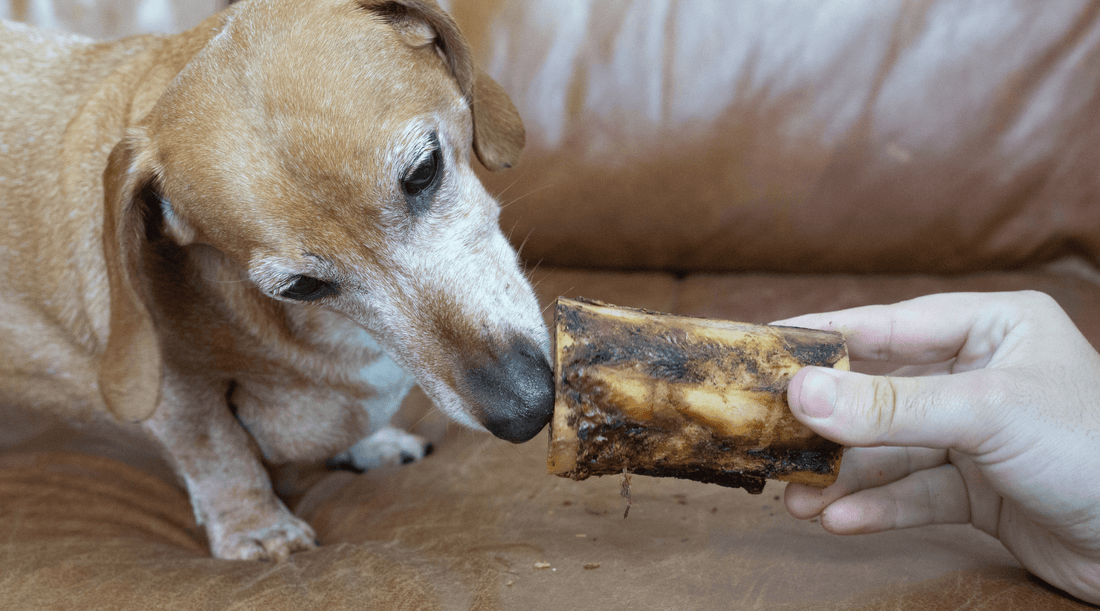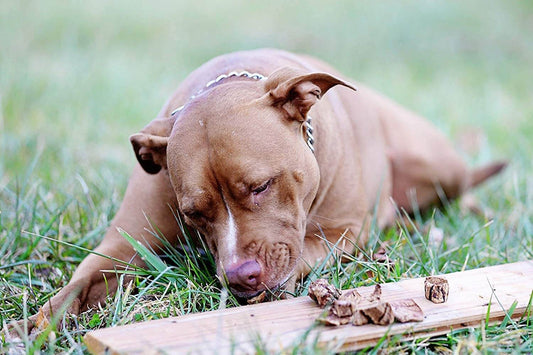Bones for Older Dogs: A Guide to Senior-Friendly Chews
Dawn Miller Nov 23, 20245 Minute ReadThe other day, I helped our local shelter host their annual “Golden Paws Party." It's an event designed just for the senior pups of the community. There were fluffy beds set up for senior dog massages and grooming, low-impact games for gentle play, and tables with treats for our older furry friends. There were even special dog-friendly beef bone broth popsicles to keep everyone cool! It was an inspiring reminder of how important it is to consider the unique needs of our senior dogs.
As I chatted with other pet parents about everything from senior steps to comfortable dog beds, the topic of chew bones came up. Most of us agreed that finding the best dog bones for older dogs can be a bit of a challenge. We agreed that we wanted something that offered both enjoyment and health benefits without causing strain on sensitive teeth or joints.
Why Do Older Dogs Need Bones
Chewing isn’t just a fun pastime. It’s an activity that brings mental stimulation, dental care, and even emotional comfort. These needs don't change just because a dog is older. Older dogs can still clean their teeth, maintain a stronger jaw, feel mentally stimulated, and move around as they age, thanks to the benefits of dog bones. Supporting these helps a dog have a longer quality of life, often up to their final months.
But how do we adapt to their aging bodies? The bones we gave them in middle age may not be appropriate as teeth become more brittle, the jaw aches with arthritis, and gums flare up, leading to loosened teeth.
Senior dogs have special needs, for sure!
What Are the Best Dog Bones for Older Dogs?
The best chew bones for dogs depend on the state of your dog's teeth and jaw. If they appear tender when eating kibble or have been transitioned to soft food, then a beef dog bone may no longer be the best option. Even though they can still benefit from the bone marrow, they would have a hard time with the bone itself.
Instead, consider beef trachea. I like beef trachea treats for seniors and all dogs really. These are made out of chewy cartilage instead of bone. It's softer on teeth. But it has a lot of nutrition. Cartilage is loaded with glucosamine and chondroitin, demonstrating joint health and comfort benefits. Trachea also contains a lot of collagen for healthy bones, joints, skin, and teeth. It's also relatively low in fat for dogs with weakening pancreas or frequent tummy upset.
Another good choice to look into is beef lung bites. These are little bits of organ meat. They have nutrition similar to trachea and have some texture. So they can help clean the teeth. But they're much softer and easier to chew.
Now, if your dog has been chewing on all-natural marrow bones up through middle age, then their teeth and gums are probably a lot healthier than the typical senior dogs. So, don't deny them their favorite dog bone if they're still able to chew on it. That would be a mistake.
Studies have shown that chewing on dog bones reduces cavity and gum-disease-causing bacteria in the mouth by 60-80% after just 12 weeks of chewing several times a week. The gnawing action removes bacteria-harboring plaque. While I couldn't find any long-term studies, I could logically extrapolate that a dog who keeps their plaque and bacteria under control in mid-life is probably going to have healthier teeth and gums as senior dogs.
Can Older Dogs Still Chew on Bones?
It depends on the state of the teeth, gums, and jaw. Chewing on bones may not be out of the question.
Marrow bones can be a safe, nutritious choice for older dogs, provided they are given in moderation. Marrow is rich in fat, so you may want to limit how often you offer these to prevent any tummy troubles. Additionally, opt for grass-fed beef bones, because these have 2.5X more anti-inflammatory omega 3 and 20% less saturated fat than the less natural grain-fed herds.
In moderation, marrow bones offer an incredible nutritional boost, including:
- Healthy Fats for Energy
- Collagen for Skin and Joint Support
- Vitamins B and A for Immune Support
- Calcium and iron are needed for healthy bones and muscles.
But as a dog mom, I'd reassess the situation frequently because dog health can change in a matter of months.
If they start to look like they're in pain, making weird chewing noises, or rejecting their bone, it's time to switch to beef trachea, the softer chew that some have called "the natural toothbrush" and others the best "joint supplement" for senior dogs.
And if that becomes too much for them, try single-ingredient beef lung dog treats. I'd add some beef bone broth to their food to make sure they're getting the benefits of that rich bone marrow found in beef dog bones.
Choosing the Right Bone Size and Type
If you've decided your senior can have real bones, the size matters even more for older dogs. The bone should be big enough that they can’t swallow it but manageable enough for gentle chewing.
For smaller dogs, consider bones like smaller marrow bones like K9 Delights.
For medium dogs, Look for Beef kneecaps or Champs meaty marrow bones. The broad surfaces on these make it easier for seniors to access the bone marrow.
Then, for large dogs like my lab mix Bruno, knucklebones are ideal for larger senior dogs, providing the right balance between chew satisfaction and safety.
Transitioning from Midlife to Senior Dog
Each time you give your middle-aged dog a bone, you impact their health span. While lifespan describes how long someone lives, health span is the length of someone's quality of life. It's how long they stay active and capable of performing daily activities. It's how long they can enjoy spending time with you and live relatively free of pain.
So, if a smaller dog lives to the ripe old age of 14, health span determines how many of those 14 years they stay relatively healthy.
This means being able to eat without pain and stay mobile, among other factors.
For this reason, I start my dogs on a chew time regimen from an early age. Dogs as young as 6 months can begin experiencing the benefits of marrow bones for dogs. They can then maintain healthier teeth, gums, jaws, bones, and joints until their senior years.
One of my favorite parts about marrow bones is that I can refill them with dog-safe fillings—like mashed sweet potatoes or a pumpkin and yogurt blend—to give my lab mix Bruno a fun, soft treat that’s easier on his aging teeth. You can download this free dog bone refill guide for more ideas.
Marrow Bones for Dogs: My Final Thoughts on Senior Dog Treats
The best dog bones for older dogs will depend on the state of your dog's teeth and jaw. If you're unsure, ask your vet. Starting your dog on healthy marrow bones early is a great way to extend your dog's health span by keeping their mouth healthier in mid-life, directly impacting their senior years.
Available On:
Disclosure: This article may contain affiliate links, which means we may earn a small commission if you make a purchase through these links—at no extra cost to you. We only recommend products we trust and believe will benefit you and your K9.






